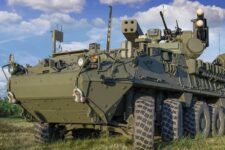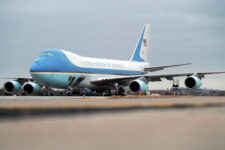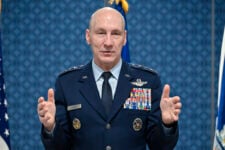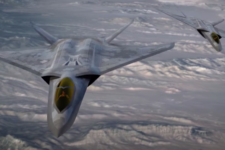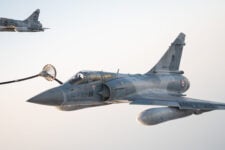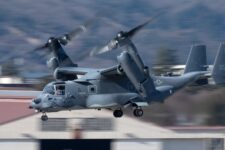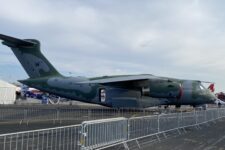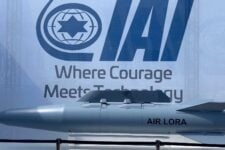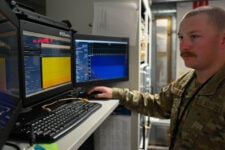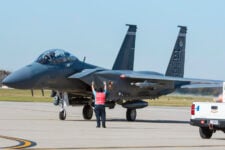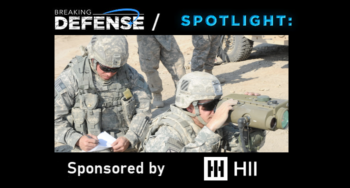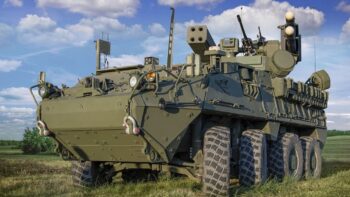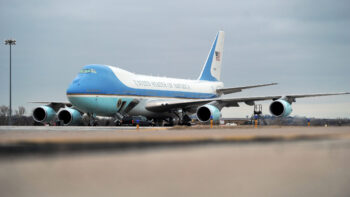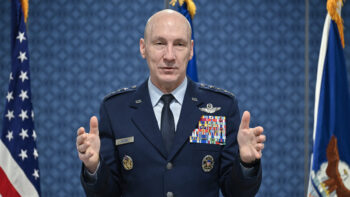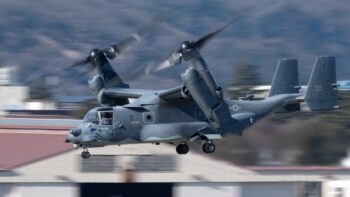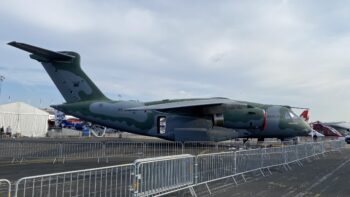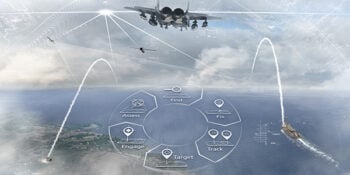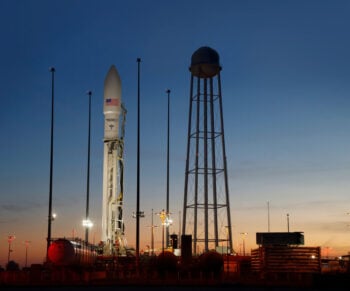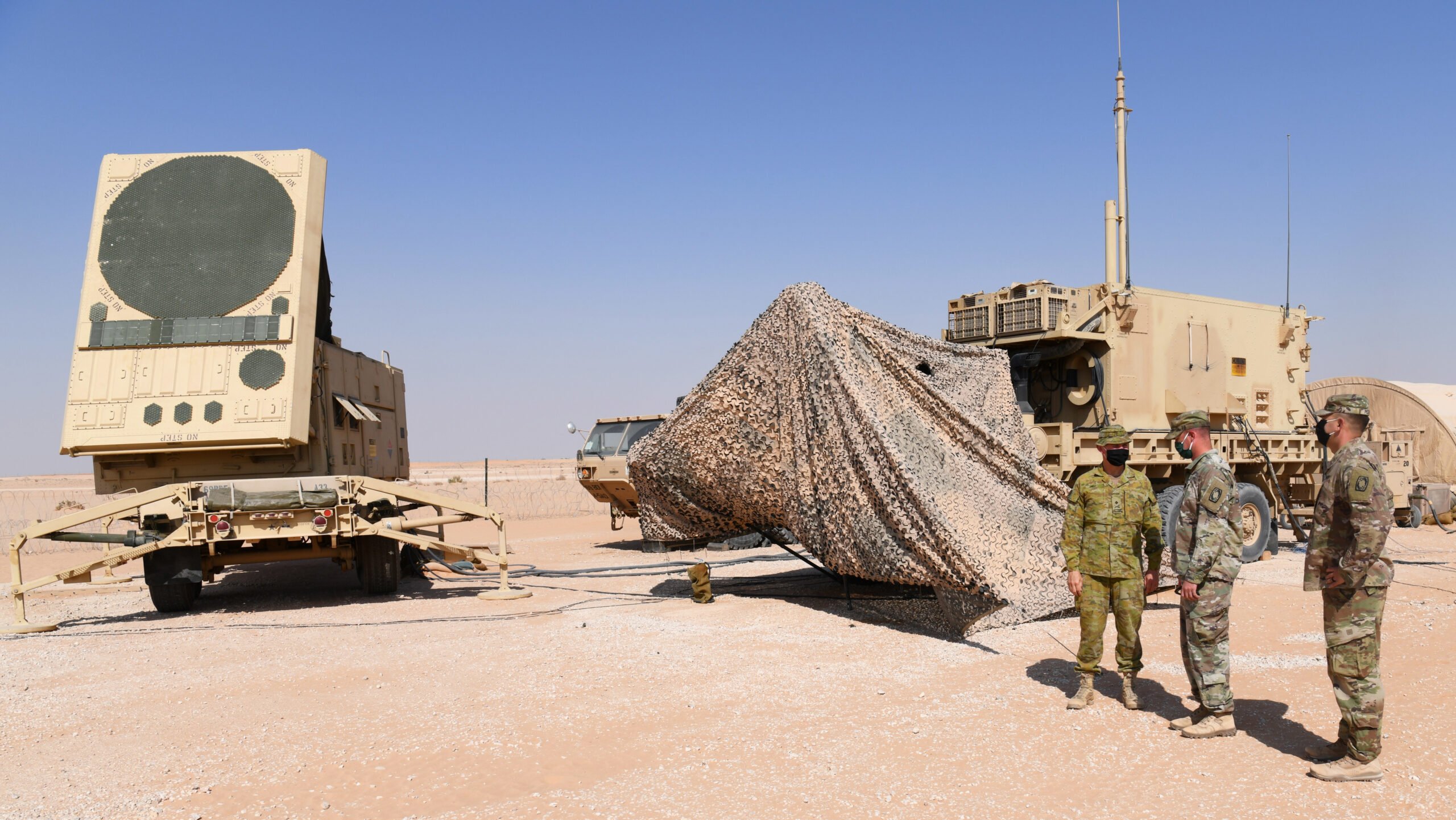
Australian Maj. Gen. Field, deputy commanding general of operations for United States Army Central, toured Prince Sultan Air Base, Kingdom of Saudi Arabia, Nov. 10, 2020. The purpose of the visit was to increase the general’s understanding of integrated air defense posture throughout the Middle East. (U.S. Air Force photo by Tech. Sgt. Wes Wright).
BEIRUT — The US and Gulf Cooperation Council countries today announced a new iteration of defense working groups to be based in Saudi Arabia to “advance US-GCC cooperation and multilateral [missile] integration against shared air and maritime threats,” according to a senior US defense official.
The move comes weeks after Israel, the US and other nations intercepted most of the 300 missiles and drones Iran fired toward Israel on April 13 in what the official called a “proof of concept of integrated air and missile defense.” No GCC nations are known to have taken a direct part in the defensive operation, but the incident was “ultimately successful in sparking deeper cooperation among our partners,” the official told reporters this week, on the condition of anonymity, ahead of today’s announcement.
RELATED: After shooting down Iranian munitions, Jordan defiant in uncomfortable spotlight
The ultimate goal of the new talks is to ensure the nations share information effectively enough that they can can work from a “common air picture” and act together in “other ways [to erode] the effectiveness of Iran’s missile and UAV capabilities.”
“Our basic message as we head into these discussions is we’re stronger when we act together,” the defense official said. “These conversations are really more important than ever.”
Up until now some Middle Eastern nations, including the six GCC nations — Saudi Arabia, the United Arab Emirates, Qatar, Oman, Bahrain and Kuwait — have explored better air defense and data-sharing cooperation in fits and starts, including talk in 2022 of a NATO-like alliance for the Middle East, which seemed to make little public progress, and an announcement by Israel the same year of a regional air defense network, though any details about that arrangement have been few and far between.
“The desire for interoperability, track data-sharing, and the development of a common air picture among the several GCC nations has long been a topic of discussion, but regional political rivalries have stood in the way time and time again,” Tom Karako, a missile defense expert at the Center for Strategic and International Studies, told Breaking Defense. “If [past] experiences have not been enough of a lesson to change the political resistance, it seems unclear what will be.”
The US and GCC have had working groups before, including a previous iteration of this particular group last year, but the US official said that Iran’s “destabilizing and dangerous behavior is given a newfound urgency and newfound energy to convene this working group and build out the elements of integrated air and missile defense.” Middle Eastern nations have also watched warily the attacks by Houthi rebels in Yemen on shipping and the exchange of rocket fire by Israel and Hezbollah in southern Lebanon.
“And so if anything, those developments have made all of our partners lean forward and be more interested in engaging with us, engaging with each other to see how we each pool our knowledge and resources, our training, and in our respective domain awareness to ensure that everybody has greater capability to work to defend against that [threat],” the official said.
A Focus On Early Warning
One focus for the working groups, the official said, “will be around upgrading early warning systems.”
“Obviously, the more time a country or a defensive force has to address an attack, the more time it has to defend against it, and more it can erode its effectiveness even when it occurs,” the official said.
Early warning, he said, was “the secret of success” in countering the April 13 attack. (Iran said it provided its own early warning to some countries days ahead of the strike, though the US was not among them.)
“[We] could really plan an entire strategy and an entire choreography of how various threats will be addressed by whom, in what locations, and what environments. It was very much key to the success of that effort, and that’s going to be a very important discussion,” the official said.
The official said the US has conducted assessments for threats that violate GCC “sovereign airspace,” which will be a topic of discussion.
When it comes to maritime threats, the official said, the US and GCC will “share our sense of the maritime threats and we’ll discuss the multilateral efforts to bolster information sharing, counter-proliferation [and] ways to increase the effectiveness of combined interdictions and technologies to increase maritime domain awareness.”
Sitki Egeli, a defense expert and professor at Izmir Economics University, told Breaking Defense speedy data-sharing would be crucial to blunting any future Iranian attack in the Gulf.
“If you are talking about longer-range missiles or larger areas to protect, then you definitely need such exchange of information,” he said. He said that much of the early warning mission is done via satellites, for which the GCC countries would have to rely on the US, before that information is passed on to ground-based radars and, eventually, the right interceptors.
Cooperation will be necessary if Iran attempts to saturate air defenses through sheer mass, Egeli said.
“[For] Iranians in order to overwhelm defenses, they try to saturate, to send as many missiles and drones and cruise missiles as possible all at the same time from different directions, and this is exactly what they did in the most recent attack,” he said, noting that for the April 13 attack, air defense proved “resilient.”
Still, he said that by numbers alone, Iran has the “upper hand” because they have more missiles than the US and GCC have pricey interceptors.
But for the US official, this round of working groups is a step in the right direction and made in view of what Tehran has shown it can do on offense.
The foiled April 13 attack was a “stark testament to the value of integrated air and missile defense, and its vital importance for regional stability,” the official said. “The attack gave the world the opportunity to see what a partnership with the United States can be. And it really showcased what we’re collectively capable of when we work together on defeating regional security threats.”
Meet Sergeant Stout: Army gives Stryker-Based M-SHORAD a proper name
As the service rolls out a name change for the new(ish) air defense weapon, it is also eyeing future upgrades that could integrate with robots and new interceptors.
